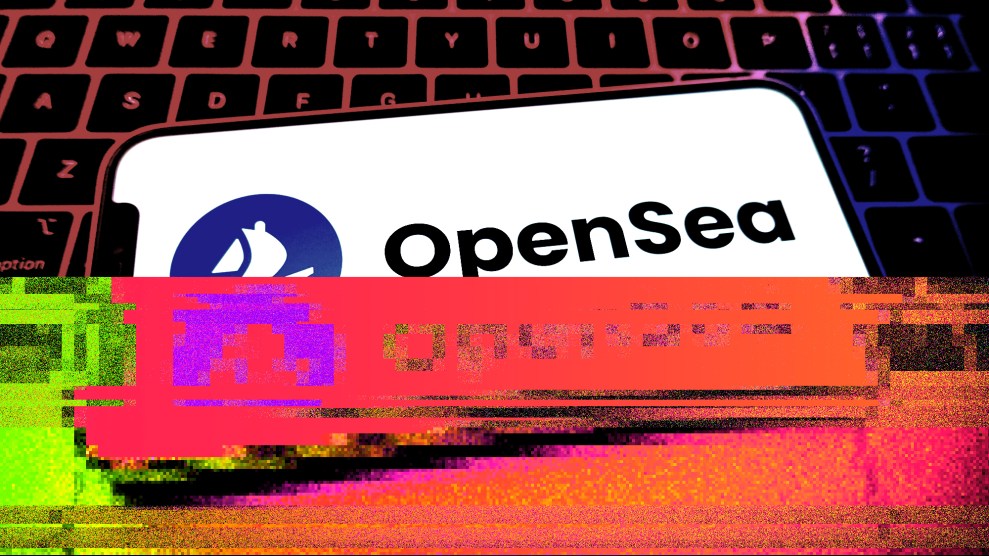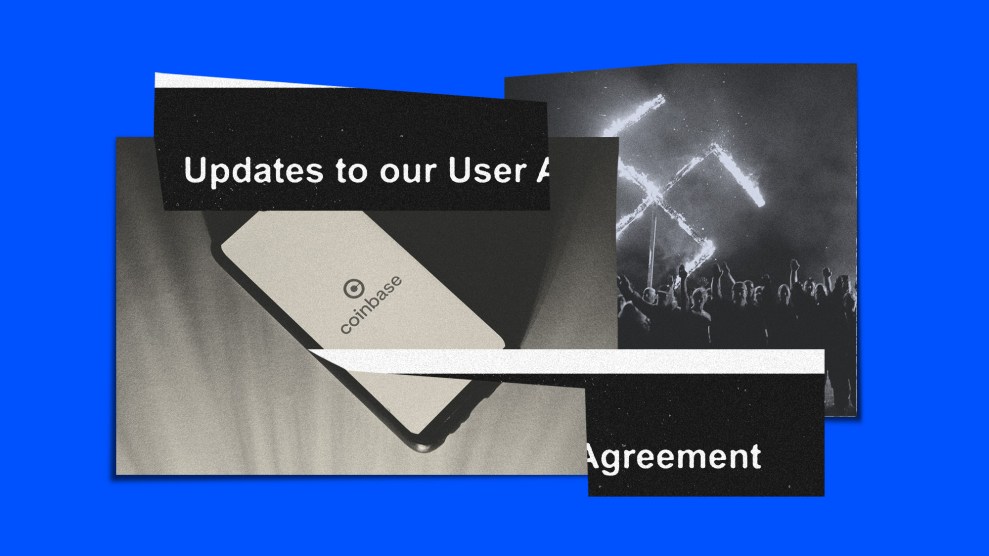
Mother Jones illustration; Sheldon Cooper/SOPA/Getty
When the NFT trading platform OpenSea agreed to meet with representatives from Color of Change, staffers at the civil rights advocacy group assumed that meant that the largest and most prominent business in the space would be receptive to suggestions on making their business more inclusive.
Before their first video conference in April, Color of Change had found, through a series of quick searches, that OpenSea was facilitating and profiting from the sale of a slew of indefensibly racist and antisemitic collections of NFTs. (Non-Fungible Tokens are commodities based on crypto blockchains that usually signify ownership of digital art, videos, or photos.)
When questioned about those tokens in a series of three meetings that unfolded into September, OpenSea staffers defended their presence as a matter of not stifling users’ expression and creativity. Participants in the meetings from OpenSea, according to the Color of Change representatives, falsely claimed the inability to police their site, compared their platform to the Holocaust Museum, and ultimately defended leaving up NFTs that used the n-word, depicted Black people as racist caricatures, and that featured antisemitic, pro-Nazi content.
OpenSea is far and above the most well-known and used NFT trading platform; it has accrued over 1 million users, who have traded billions of dollars worth of NFTs. One 2022 survey found that a quarter of Black Americans own crypto—only 15 percent of whites do—and Color of Change set up the meetings as part of an effort to make the space more hospitable for people of color.
OpenSea’s response tracks with a broader hesitation to grapple with racial issues in Web 3, as the ostensibly decentralized apps and communities around crypto are collectively known. The heavily white, male community of Web 3 founders and developers who built a libertarian dream have sometimes been resistant to adjust to the reality of society’s persistent inequities. In 2020, in the wake of demonstrations over George Floyd’s murder, Coinbase CEO Brian Armstrong announced a controversial policy barring employees from debating “causes or political candidates internally that are unrelated to work.” A year later, his company quietly pulled language from its prohibited uses policy that explicitly barred users from using the crypto platform to “encourage hate” and “racial intolerance.”
Color of Change staff said that the meetings took place with senior staff and vice presidents at OpenSea, including its chief business officer, vice president of public policy, and vice president of trust and safety. An OpenSea spokesperson did not make anyone from their staff who attended the meetings available for an interview, and contested elements of Color of Change’s account.* They also pointed to a company policy that bars users from using OpenSea to “attack” protected groups and allows the company to delist or freeze tokens that include hate symbols or could cause “real-world” harm.
Despite that policy, the platform remains rife with NFTs featuring racist depictions of black people, slurs, and antisemitic or pro-Nazi sentiment. “If you go onto OpenSea, you can search ‘Hitler,’ racial slurs, and see all sorts of racist and bigoted content,” says Kyle Bibby, a senior campaign director at the organization who was briefed on the meetings by colleagues. “There’s not an attempt by OpenSea to keep these things off the platform.”
Color of Change came to the meetings with screenshots of egregiously racist NFTs being exchanged on the platform, and recommendations for how OpenSea could attempt to tamp down such content. In the advocates’ telling of events, the initial two meetings were mostly unremarkable. At the third and final meeting, only Black Color of Change employees took part; a spokesperson for the organization said that they noticed a “major difference in how their team treated us” without a white colleague involved. In this meeting, according to two Color of Change staffers who attended, the company attempted to mislead the advocates by saying that it was actually impossible for them to take enforcement action.
OpenSea claimed that because NFTs are on the immutable Ethereum blockchain (true) that it would be impossible for the company to remove any individual NFT from their platform (not true), and that removing NFTs from the platform would go against the “principles of the blockchain,” according to Color of Change staffers. (An OpenSea spokesperson disputed their account, saying the company’s representatives were simply explaining how their platform works in relation to the blockchain.)
OpenSea has removed racist NFT collections in the past, like “Floydies,” pixel cartoon depictions of George Floyd, and Meta Slaves, which were just portraits of black faces. The Color of Change staffers recall pressing the issue, and that OpenSea’s representatives switched to saying that it was a matter of free speech in which they would not intervene. “They argued that have a duty to keep this stuff on their platform because they positioned themselves as a museum,” said one of the Color of Change staffers present in the meeting. (In truth, most museums only display a fraction of their collections, picking and choosing what is suitable for public exhibition.) According to two Color of Change representatives who were present, a staffer from OpenSea then asked if it would be appropriate for the Holocaust Museum to take down Nazi paraphernalia it displayed.
“It was an incredibly inartful and inaccurate analogy,” Bibby told me, his voice betraying that he remained astounded by an interaction that had taken place months earlier. “The Holocaust Museum, they wouldn’t want to be a home of hate content. It’s carefully curated to explain the harms of Nazism.” Moreover, Bibby noted, the United States Memorial Holocaust Museum operates as a non-profit and charges no entry fee in the service of educating visitors. OpenSea is an expressly for-profit, venture-backed company that charges a 2.5% fee on the billions of dollars of value that’s been exchanged on its platform. (An OpenSea spokesperson said staff who took part in the meeting did not recall mentioning the Holocaust Museum.)
Among the NFT collections Color of Change found trading on OpenSea and flagged to the platform’s employees was one called “I Don’t Like N—-rs,” which showed a Black man in denim overalls. Others include a collection called “Dirty N—-r” which offered an NFT called “The Face of American Crime,” that was a collage of Black men’s mug shots.
Despite their protestations in the meetings, OpenSea has since removed some of the collections that Color of Change brought to their attention. In a statement, an OpenSea spokesperson said that the company was “grateful to Color of Change for their thoughtful feedback and ongoing dialogue” and that they “take external and community feedback seriously.” The spokesperson said that the company had integrated and been informed by several of Color of Change’s suggestions.
Bibby said that seeing the worst of the NFTs reminded him of when he began exploring AOL and internet chatrooms. “I can remember when I first got a computer and I was excited to get online. After being on for a bit, I found forums where people were saying anti-black things and antisemitic things, and that affected me,” said Bibby, a Black man. “I know I’m not alone. It has a real effect on people, which is an important thing for folks to understand. We told that to OpenSea.”
Correction: An earlier version of this article gave incorrect titles of meeting attendees and mischaracterized OpenSea response to Mother Jones’ queries.
















